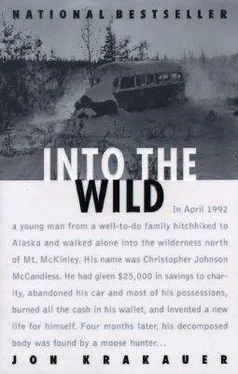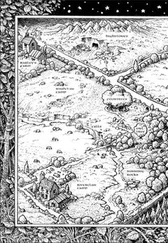Among the residents of the Niland Slabs was a seventeen-year-old named Tracy, and she fell in love with McCandless during his week-long visit. “She was this sweet little thing,” says Burres, “the daughter of a couple of tramps who parked their rig four vehicles down from us. And poor Tracy developed a hopeless crush on Alex. The whole time he was in Niland, she hung around making goo-goo eyes at him, bugging me to convince him to go on walks with her. Alex was nice to her, but she was too young for him. He couldn’t take her seriously. Probably left her brokenhearted for a whole week at least.”
Even though McCandless rebuffed Tracy’s advances, Burres makes it clear that he was no recluse: “He had a good time when he was around people, a real good time. At the swap meet he’d talk and talk and talk to everybody who came by. He must have met six or seven dozen people in Niland, and he was friendly with every one of them. He needed his solitude at times, but he wasn’t a hermit. He did a lot of socializing. Sometimes I think it was like he was storing up company for the times when he knew nobody would be around.”
McCandless was especially attentive to Burres, flirting and clowning with her at every opportunity. “He liked to tease me and torment me,” she recalls. “I’d go out back to hang clothes on the line behind the trailer, and he’d attach clothespins all over me. He was playful, like a little kid. I had puppies, and he was always putting them under laundry baskets to watch them bounce around and yelp. He’d do it till I’d get mad and have to yell at him to stop. But in truth he was real good with the dogs. They’d follow him around, cry after him, want to sleep with him. Alex just had a way with animals.”
One afternoon while McCandless was tending the book table at the Niland swap meet, somebody left a portable electric organ with Burres to sell on consignment. “Alex took it over and entertained everybody all day playing it,” she says. “He had an amazing voice. He drew quite a crowd. Until then I never knew he was musical.”
McCandless spoke frequently to the denizens of the Slabs about his plans for Alaska. He did calisthenics each morning to get in shape for the rigors of the bush and discussed backcountry survival strategies at length with Bob, a self-styled survivalist.
“Me,” says Burres, “I thought Alex had lost his mind when he told us about his ‘great Alaskan odyssey,’ as he called it. But he was really excited about it. Couldn’t stop talking about the trip.”
Despite prodding from Burres, however, McCandless revealed virtually nothing about his family. “I’d ask him,” Burres says, “ ‘Have you let your people know what you’re up to? Does your mom know you’re going to Alaska? Does your dad know?’ But he’d never answer. He’d just roll his eyes at me, get peeved, tell me to quit trying to mother him. And Bob would say, ‘Leave him alone! He’s a grown man!’ I’d keep at it until he’d change the subject, though-because of what happened between me and my own son. He’s out there somewhere, and I’d want someone to look after him like I tried to look after Alex.”
The Sunday before McCandless left Niland, he was watching an NFL playoff game on the television in Burres’s trailer when she noticed he was rooting especially hard for the Washington Redskins. “So I asked him if he was from the B.C. area,” she says. “And he answered, ‘Yeah, actually I am.’ That’s the only thing he ever let on about his background.”
The following Wednesday, McCandless announced it was time for him to be moving on. He said he needed to go to the post office in Salton City, fifty miles west of Niland, to which he’d asked the manager of the Bullhead McDonald’s to send his final pay-check, general delivery. He accepted Burres’s offer to drive him there, but when she tried to give him a little money for helping out at the swap meet, she recalls, “he acted real offended. I told him, ‘Man, you gotta have money to get along in this world/ but he wouldn’t take it. Finally I got him to take some Swiss Army knives and a few belt knives; I convinced him they’d come in handy in Alaska and that he could maybe trade them for something down the road.”
After an extended argument Burres also got McCandless to accept some long underwear and other warm clothing she thought he’d need in Alaska. “He eventually took it to shut me up,” she laughs, “but the day after he left, I found most of it in the van. He’d pulled it out of his pack when we weren’t looking and hid it up under the seat. Alex was a great kid, but he could really make me mad sometimes.”
Although Burres was concerned about McCandless, she assumed he’d come through in one piece. “I thought he’d be fine in the end,” she reflects. “He was smart. He’d figured out how to paddle a canoe down to Mexico, how to hop freight trains, how to score a bed at inner-city missions. He figured all of that out on his own, and I felt sure he’d figure out Alaska, too.”
ANZA-BORREGO
No man ever followed his genius till it misled him. Though the result were bodily weakness, yet perhaps no one can say that the consequences were to be regretted, for these were a life in conformity to higher principles. If the day and the night are such that you greet them with joy, and life emits a fragrance like flowers and sweet-scented herbs, is more elastic, more starry, more immortal,-that is your success. All nature is your congratulation, and you have cause momentarily to bless yourself. The greatest gains and values are farthest from being appreciated. We easily come to doubt if they exist. We soon forget them. They are the highest reality… The true harvest of my daily life is somewhat as intangible and indescribable as the tints of morning or evening. It is a little star-dust caught, a segment of the rainbow which I have clutched.
henry david thoreau,
vfalden, or life in the woods
passage highlighted in one of the books found
with chris mccandless’s remains
On January 4, 1993, this writer received an unusual letter, penned in a shaky, anachronistic script that suggested an elderly author. “To Whom It May Concern,” the letter began.
/ would like to get a copy of the magazine that carried the story of the young man (Alex McCandless) dying in Alaska. I would like to write the one that investigated the incident. I drove him from Salton City Calif… in March 1992… to Grand Junction Co… I left Alex there to hitch-hike to S.D. He said he would keep in touch. The last I heard from him was a letter the first week in April, 1992. On our trip we took pictures, me with the camcorder + Alex with his camera.
If you have a copy of that magazine please send me the cost of that magazine…
I understand he was hurt. If so I would like to know how he was injured, for he always carried enough rice in his backpack + he had arctic clothes + plenty of money.
sincerely, ronald A. franz
Please do not make these facts available to anybody till I know more about his death for he was not just the common wayfarer. Please believe me.
The magazine that Franz requested was the January 1993 issue of Outside, which featured a cover story about the death of Chris McCandless. His letter had been addressed to the offices of Outside in Chicago; because I had written the McCandless piece, it was forwarded to me.
McCandless made an indelible impression on a number of people during the course of his hegira, most of whom spent only a few days in his company, a week or two at most. Nobody, however, was affected more powerfully by his or her brief contact with the boy than Ronald Franz, who was eighty years old when their paths intersected in January 1992.
Читать дальше












